Social Issues
APSW has the advantage
of understanding Thai women's needs from a local perspective while receiving international attention and support.
APSW's programs are successfully impacting the social,economic and political status of Thai women while providing shelter and care for distressed women and children
- Social Norms
- Domestic Violence
- Prostitution
- HIV/AIDS
- Discriminatory Laws
|
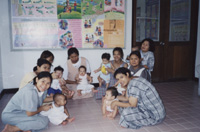 |
Social Norms
Traces of traditional male dominance are still found in modern Thai social attitudes, affecting how women have been placed in inferior positions.
Both men and women
assert that:
- Wife and child are assets of the husband
- Extra-marital affairs are not punishable for men, yet social and legal consequences exist for women
- Men are the front leg of the elephant while women are the hind legs, reinforcing the belief that men are to be leaders and women are to follow
- Women are portrayed as sex objects
- Sons are more important than daughters
- Interpretations of Buddhism's gender hierarchy portrays women as second-class citizens to their male counterparts
|
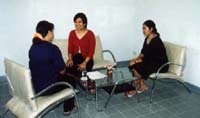 |
Domestic Violence
- Gender-based physical and sexual violence is a great concern as its threat and impact instill fear and insecurity in women's lives.
- Domestic violence acts as an obstacle to full development of many women and undermines their productive capacity.
- Domestic violence is viewed as a private matter instead of a social issue leading to a lack of public understanding of the problem.
|
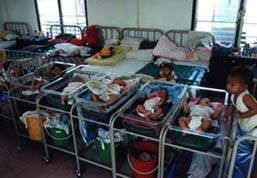
Among 2800 women interviewed around Bangkok, 44% reported being abused by their husband or partner
|
What APSW is doing about domestic violence…
APSW's Emergency Home, Kanitnaree Rape Crisis Center and Women's clinic provides assistance to domestic violence victims through…
* Rehabilitation service
* Facilitation in the judicial process
* Shelter and counseling
- In addition, the Bangkok Metropolitan Administration has set up volunteer groups in all of Bangkok's 50 districts to help prevent future domestic violence cases.
- GDRI documents violence against women and children for further research and study on violence, awareness raising and public policy advocacy
|
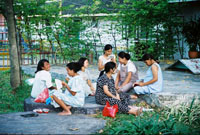 |
Prostitution
- International sex tourism in Thailand has long been a major global concern, yet the sex industry services more local men than foreign clientele
- Due to the poverty in rural areas, many young girls are lured into prostitution for the high wages and their lack of qualifications for other urban employment
- Prostitution is deeply rooted in Thai culture
|
According to the Public Health Ministry of Thailand, 75% of all Thai males have visited a prostitute and 47% of teenage boys have their first sexual encounter with a prostitute
|
What APSW
is doing about
Prostitution…
- APSW provides long-term measures to eliminate poverty and create a well paying alternative to free women from the economic necessity of selling their bodies
- Through their WE-Train program, 17 vocational training programs are offered.
|
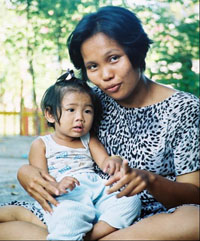 |
HIV/AIDS
- AIDS is ranked first as the leading cause of death in Thailand
- Although the overall AIDS numbers are declining, the number of women with AIDS is increasing
- In Thailand, the AIDS virus has spread beyond drug users and prostitutes and is affecting married women and children, often due to their husbands frequenting brothels
-
In most cases, when men are infected, they get well looked after by their wives, but when women get infected, they are often abandoned by their partner.
|
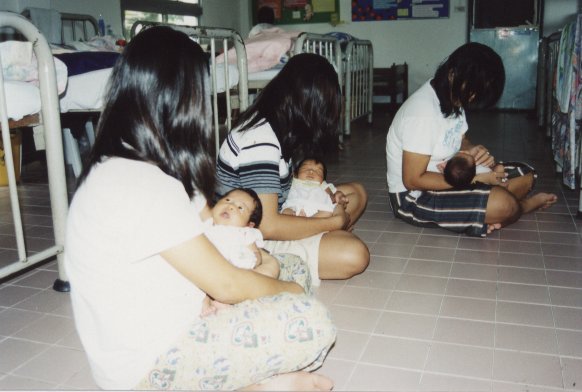 |
What APSW is doing
about HIV/AIDS…
- Among the HIV/AIDS cases receiving assistance from the emergency home, about 90% are housewives who have been infected by their husbands
- Patients seeking support from APSW's Women's Clinic receive anti-retroviral drugs while newborn infants of HIV- positive mothers are provided with syrup and replacement feeding
- APSW's programs encourage women to come forward, improve their physical health and receive counseling from social workers
- The Youth Center and Teen House focus on reproductive health awareness and HIV/AIDS prevention
|
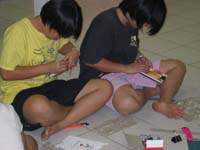 |
Discriminatory
Laws
- Despite the constitutions provision for gender equality, there are laws and regulations that are still discriminatory for women, particularly those related to family institutions
- Problematic laws that victimize or fail to protect women include the abortion law, the marriage law and the rape law
- Discrimination in other areas also exists, such as unfair treatment of women workers, employment practices and access to resources.
- If more female reps existed in government, women's concerns would be address, thus improving their opportunities and eliminating their powerlessness.
|
 |
What APSW is doing
about Discriminatory
Laws ….
- Attempt to increase number of female representatives existing in the government
- GDRI lobbies political parties to have clearer policies on women
- GDRI enhances women's leadership skills to enable more women to participate affectively in local and national administration, leveraging gender discrimination.
|
|
2004 Statistics:
45,00 women seeking assistance
150 women and children sheltered at the Emergency home on any given day
91 Children receiving care from the Children's home
20 Average number of children at the Children's home each day
17 Vocational skills training courses offered
1,340 Women participating in the WE-TRAIN program
89 Infants at the Nursery
120$ Cost of one child per month
150 $ Cost of one women pe
r month(includes counseling)
98 APSW staff
80% Success rate able to apply vocational skills in their new jobs
1,743 Students participants in youth awareness raising sessions (reproductive health issues, HIV/AIDS)
200,000 Number of women in Thailand living with AIDS
3,635 women received hotline counseling
1,174 donation boxes placed in various places in BKK and other provinces
|
|
Why You Should Care!
With Western awareness and support, we can help to build an equitable society for Thai women and men.
- Thai women need to be heard not only at a national level, but at an international level as well.
- In Thailand, women are often controlled and objectified by oppressive social norms
- Promoting gender equality enables all people, women and men alike, to escape poverty and improve their standard of living
- Gender equality also strengthens countries ability to grow and govern effectively
|
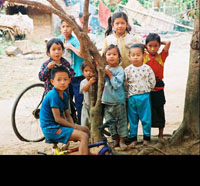
“Every time we open our hearts we create the space for a global alternative”
|
How You Can Help…
As a charitable
organization, APSW mainly operates on donations that come in all forms, including funds set up by generous donors, direct appeal,
donation boxes in various
public places and non-cash items.
All support for our projects
is warmly welcomed…
|
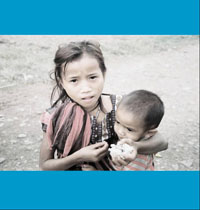
|
